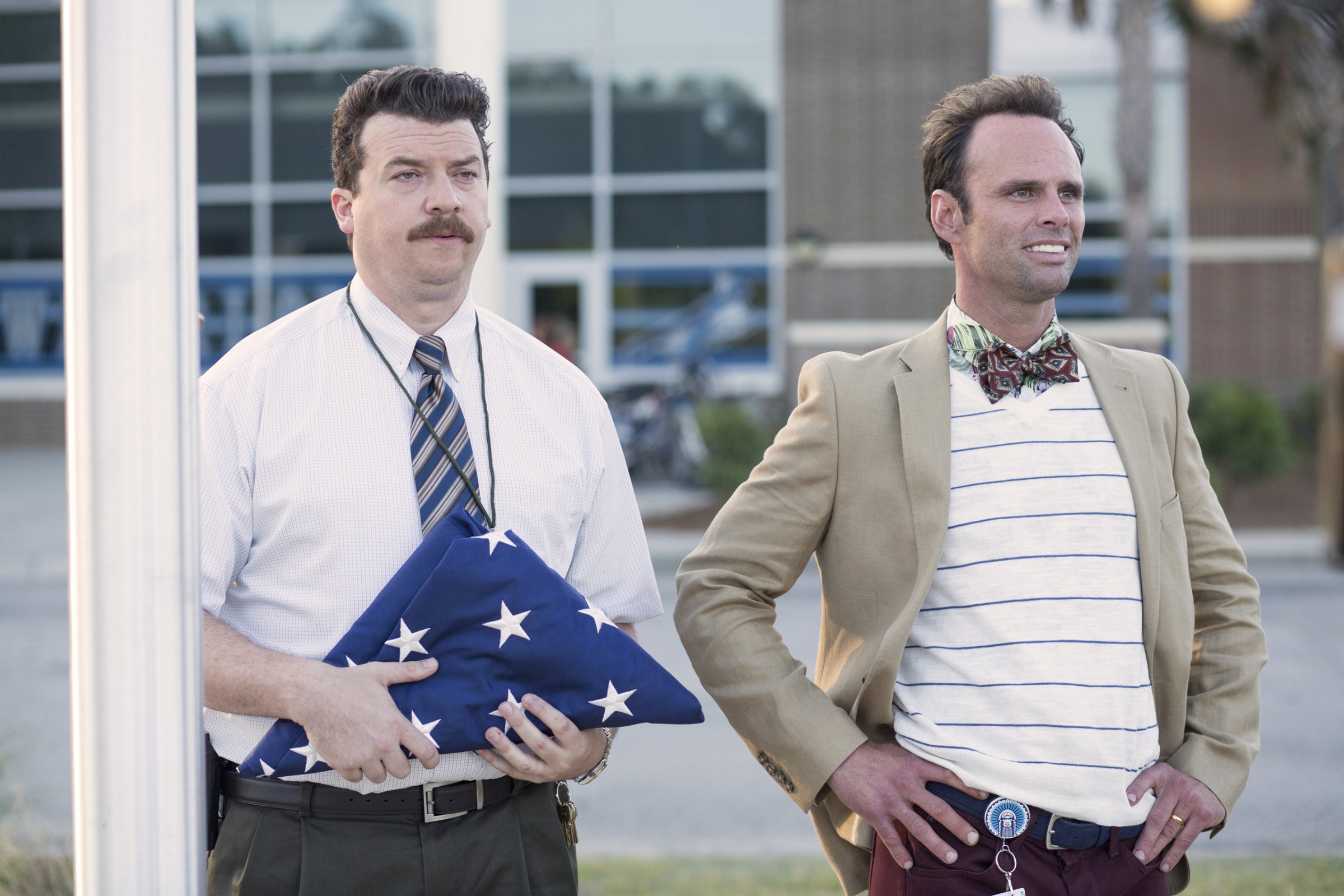
HBO’s new comedy Vice Principals, which premiered on Sunday night, provides a detailed, probing look inside the minds of two outright racist misanthropes, individuals of little substantial achievement who nevertheless feel recognition is their birthright. They’re awful to spend time with. The show is, in the six episodes I have screened so far, not consistently funny—at times coming uncomfortably close to darkness that’d be too much for most dramas to bear. Not despite but in fact because of all the qualities that make it tough viewing, Vice Principals is a show for our moment.
The show follows Neal Gamby (Danny McBride), the vice principal of a South Carolina high school who expects a big promotion when his boss (Bill Murray) abruptly quits the principal gig. After all, Gamby’s spent years issuing biting commands like “Pants up, grades up” at his young charges—at the expense of a home life or any friends, even among the faculty. When Belinda Brown, a black woman, a successful school administrator with a doctorate from Philadelphia (Kimberly Hebert Gregory), gets the job, Gamby immediately assumes she’s an affirmative-action hire—and won’t accept it. He teams up with his rival vice-principal, Lee Russell (Walton Goggins) to destroy both Brown’s confidence, her tenure as principal—and her life. Once she’s out, it’s agreed, the two can fight it out between themselves to see who becomes principal.
The story, rooted as it is in character work, carries across as at least compelling moments that might otherwise be too offensive to contemplate. Of course Gamby, a petty and ungenerous man obsessed with his own idea of fairness, assumes Brown to have been hired for reasons other than her (evident) skills as an educator; of course he’s done so little to ingratiate himself to his coworkers that they won’t even give him the fake smile-and-nod coworkers sometimes do to defuse an awkward situation. Gamby’s only ally, Russell, wears jaunty bow ties and blazers to Gamby’s utilitarian sweater-vest, and the sartorial difference carries over to their personalities: Russell takes joy in sowing chaos for its own sake, while Gamby simply wants to get what’s his.
The two disenfranchised men go on a crusade against Brown that comes to expand its tentacles into their home lives—or maybe it’s the other way around, that their boundless anger at home finds a more productive outlet in the war against Brown. Either way, Gamby and Russell’s triumphs both tactical (exploiting Brown’s inability to suffer fools to embarrass her in front of the school board) and messy (burning down her house) provide them a respite of sorts from Gamby’s inability to win back his ex-wife or connect with his daughter and Russell’s inability to make his wife happy by dealing with a nuisance neighbor.
These storylines go long stretches without providing a laugh, or even a failed laugh line. (The show has less in common with creative team McBride and Jody Hill’s previous HBO show Eastbound and Down than with their film Observe and Report, mismarketed as a comedy but actually a psychodrama about one mall cop’s quest for power.) Many lines are structured like jokes, but with misery or deflation occupying the space a punchline otherwise would. That’s to say nothing of the fact that the show’s very premise—two white men seeking to destroy the career of a high-achieving black woman simply because she has achieved—is somehow less troubling than what it looks like, episode after episode, in practice. The show has been criticized in reviews, including in Slate and Variety, for its closeness to the news, as being the last thing those weary of watching troubling election news need.
That closeness to the news is exactly why I relished Vice Principals, bingeing furiously after having been reluctant to press “Play” on episode 1. Various pieces of journalism this election cycle, including in The New Yorker and The New Republic, have placed a writer at a Donald Trump rally in order to determine just what the presumptive Republican nominee’s voters see in the man. The reporters of those pieces, though, were limited by the short amount of time and the inability to read minds. Stretching out half-hour after half-hour, Vice Principals grants us insight into exactly why a person breaks… well, not “bad,” exactly, as there’s a soul in Gamby, but vicious and territorial and mean.
Vice Principals exists outside electoral politics, but it fits into our current political scene like a hook into an eye. It subversively places white resentment at its center and dares us to look away, telling us that arson, violence, and outright bigotry are light comedy even as something in our minds tells us that’s not quite right. The show comes closer, in its twisted way, to suggesting why Americans embrace the politics of division than does much on-the-ground journalism. Gamby and Russell refuse to allow circumstances to intrude upon what they see as empirical fact, that they deserve to win. Where Vice Principals gets its charge is a question it, in its first six episodes, fails, or refuses, to answer: When will they stop?
More Must-Reads From TIME
- The 100 Most Influential People of 2024
- The Revolution of Yulia Navalnaya
- 6 Compliments That Land Every Time
- What's the Deal With the Bitcoin Halving?
- If You're Dating Right Now , You're Brave: Column
- The AI That Could Heal a Divided Internet
- Fallout Is a Brilliant Model for the Future of Video Game Adaptations
- Want Weekly Recs on What to Watch, Read, and More? Sign Up for Worth Your Time
Contact us at letters@time.com